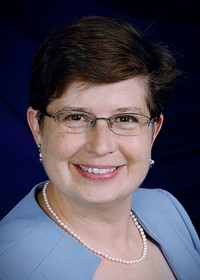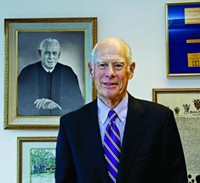Advertisement
Grab your lab coat. Let's get started
Welcome!
Welcome!
Create an account below to get 6 C&EN articles per month, receive newsletters and more - all free.
It seems this is your first time logging in online. Please enter the following information to continue.
As an ACS member you automatically get access to this site. All we need is few more details to create your reading experience.
Not you? Sign in with a different account.
Not you? Sign in with a different account.
ERROR 1
ERROR 1
ERROR 2
ERROR 2
ERROR 2
ERROR 2
ERROR 2
Password and Confirm password must match.
If you have an ACS member number, please enter it here so we can link this account to your membership. (optional)
ERROR 2
ACS values your privacy. By submitting your information, you are gaining access to C&EN and subscribing to our weekly newsletter. We use the information you provide to make your reading experience better, and we will never sell your data to third party members.
Policy
Rep. Vern Ehlers
First physicist in Congress crossed party lines to advance science and math education
by Linda Wang
August 30, 2010
| A version of this story appeared in
Volume 88, Issue 35

The scientific community is about to lose one of its biggest advocates in Congress. Rep. Vernon J. Ehlers (R-Mich.), a Ph.D. physicist, will retire at the end of this year after serving in the U.S. House of Representatives for eight-and-a-half terms.
“I owe it to my family to become an active, participating family member again,” says the 76-year-old congressman. “Item one is to spend some time with my wife. Item two is to clean the basement, which she wants me to do.”
For the past 17 years, Ehlers has been tending to issues in a different sort of house. Elected to the House of Representatives in a special election in December 1993, Ehlers became the first physicist to serve in Congress. “Having a Ph.D. gives you more credibility with the general public and perhaps with other people, too,” he says.
Part of Ehlers’ appeal is his ability to connect with the public. “If you really want to reach the average person, you have to learn to speak about the material and be able to explain it in the terms that the public will understand, and that’s not something that happens very easily,” he says. For his outreach efforts, Ehlers won an American Chemical Society Award for Public Service in 2000.
In Congress, Ehlers championed increased federal support for U.S. science, technology, engineering, and mathematics (STEM) education. With his scientific background, he gained the respect of both Democrats and Republicans. “People regard science as a bipartisan issue,” he says. “I recall one year, I was very anxious to get more money for teacher education around the country for summer workshops. I went around and met personally with every member of the appropriations committee that governed that expenditure. I managed to get a fairly substantial increase in funding as a result.”
Other achievements include a 1998 rewrite of the U.S.’s statement on science policy and the introduction of the National Science Education Acts of 2000. He also introduced legislation that established the position of deputy administrator for science and technology at the Environmental Protection Agency and helped launch the bipartisan STEM Education Caucus to support K–12 STEM education. He has served on the Committee on Science & Technology since arriving in Washington.
“As a scientist, you get used to being lonely,” says Ehlers of the fact that he’s always been among a handful of scientists in Congress. Still, he’s tried to make a difference. “I don’t expect members of Congress to know all the ins and outs of science,” he says. “I would just very quietly explain to them what the issues were, so that way I gained respect, and they learned quite a bit.”
The educator role is not new to Ehlers. “Even when I was a student in school, I was spending a lot of my time educating other kids,” he says. “I would sit down with them and explain the math problems or the science issues.”
After earning a Ph.D. in nuclear physics from the University of California, Berkeley, in 1960, Ehlers joined the faculty as a researcher and lecturer. In 1966, he moved to Grand Rapids, Mich., to become a physics professor at Calvin College. While there, he became interested in environmental issues.
“The county I was living in had serious environmental problems, so I was persuaded to run for county commissioner,” he says. “Since I was a scientist with a strong environmental interest, my friends thought I might be able to help solve such problems. I ran for county commissioner and won, and after a few years had solved most of the environmental problems.”
He later ran for and won a seat in the Michigan House of Representatives. After two years, he was elected to the Michigan State Senate.
Meanwhile, Ehlers had gotten involved in federal affairs through the American Physical Society. “I attended a meeting where a congressman who was a chemist spoke, and he encouraged us to get to know our member of Congress better, which I did. My member of Congress was Gerald Ford. I offered to him that I would put together a group of scientists to meet with him whenever he needed scientific advice,” he says. “He was very supportive of the idea, and so we met frequently and discussed the issues of concern to him.”
The experience got Ehlers thinking about “the whole idea that we have to make sure that members of Congress are adequately educated regarding scientific issues,” he says. “That eventually led to me running for Congress myself.”
Despite his 80-hour-per-week work schedule, Ehlers has tried to keep up with the latest advances in science and technology and is still a scientist at heart. “I’ve met with scientists, I tried to read some of the science journals, and I would talk with Rush Holt, who was interested in all types of science,” he says. Rep. Rush Holt (D-N.J.) also holds a Ph.D. in physics. “I just keep slugging away at it. It’s about all you can do,” he says.
And although Ehlers has made his mark in Congress as a science proponent, he still misses his days in the lab. “It’s fun to work with new ideas and be in the lab,” he says. “I miss that part of it a lot.”
True to his science roots, Ehlers admits that he carries around a pocket protector, and he’s proud of it. “It’s become a symbol,” he says. “I use it when talking to students about going into science. I tell them, ‘You’re either going to be a nerd or you’re going to work for a nerd, which would you rather do?’ Almost all of them say, ‘Be a nerd.’ ”




Join the conversation
Contact the reporter
Submit a Letter to the Editor for publication
Engage with us on Twitter